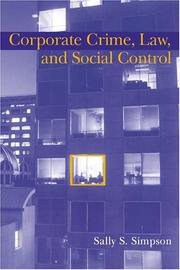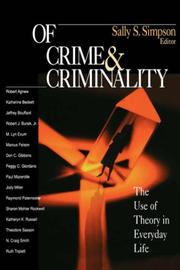| Listing 1 - 8 of 8 |
Sort by
|

ISBN: 0521589339 0521580838 9786612486760 0511673744 0511674937 0511672950 0511670400 0511606281 1282486764 0511671687 9780511674938 1107113725 9780511671685 9780511606281 9780521589338 9780521580830 Year: 2002 Publisher: Cambridge Cambridge University Press
Abstract | Keywords | Export | Availability | Bookmark
 Loading...
Loading...Choose an application
- Reference Manager
- EndNote
- RefWorks (Direct export to RefWorks)
Why do corporations obey the law? When companies violate the law, what kinds of interventions are most apt to correct their behavior and return them to compliant status? In this book Sally Simpson examines whether the shift towards the use of criminal law, with its emphasis on punishment and stigmatization, is an effective strategy for controlling illegal corporate behavior. She concludes that strict criminalization models will not yield sufficiently high levels of compliance. Empirical data suggest that in most cases cooperative models work best with most corporate offenders. Because some corporate managers, however, respond primarily to instrumental concerns, Simpson argues that compliance should also be buttressed by punitive strategies. Her review and application of the relevant empirical literature on corporate crime and compliance combined with her judicious examination of theory and approaches, make a valuable new contribution to the literature on white-collar crime and deterrence and criminal behavior more generally.
Commercial crimes -- Prevention. --- Corporations -- Corrupt practices. --- Corporate bribery --- Corporate corruption --- Commercial crimes --- Corporations --- Corporate crime --- Business ethics --- Crimes, Financial --- Financial crimes --- Offenses affecting the public trade --- Crime --- Prevention --- Corrupt practices --- Commercial crimes. --- Corrupt practices. --- Prevention. --- E-books --- Entreprises --- Infractions économiques --- Pratiques déloyales --- Prévention --- Social Sciences --- Sociology --- Comportement conforme --- Criminalisation --- Delinquance economique et financiere --- Dissuasion --- Efficacite du droit penal
Book
ISBN: 1452232237 1452264813 9781452264813 Year: 2000 Publisher: Thousand Oaks, Calif. : Pine Forge Press,
Abstract | Keywords | Export | Availability | Bookmark
 Loading...
Loading...Choose an application
- Reference Manager
- EndNote
- RefWorks (Direct export to RefWorks)
This collection of original essays is an innovative, effective way to teach crime theory to undergraduates. Each essay brings an important crime theory to life by applying that theory to a current crime event or topic of interest to students. An original introductory essay by Don Gibbons explains the origins of these different explanations for criminal behaviour, and how they are similar to and different from one another.
Crime. --- Criminal behavior. --- Criminal justice, Administration of. --- Criminology. --- Crime --- Social sciences --- Criminals --- Administration of criminal justice --- Criminal justice, Administration of --- Justice, Administration of --- Criminal law --- Criminal psychology --- Deviant behavior --- City crime --- Crime and criminals --- Crimes --- Delinquency --- Felonies --- Misdemeanors --- Urban crime --- Social problems --- Criminology --- Transgression (Ethics) --- Study and teaching --- Law and legislation --- Social aspects

ISBN: 0761986383 Year: 2000 Publisher: Thousand Oaks (Calif.) : Pine Forge press,
Abstract | Keywords | Export | Availability | Bookmark
 Loading...
Loading...Choose an application
- Reference Manager
- EndNote
- RefWorks (Direct export to RefWorks)
Crime. --- Criminal behavior. --- Criminal justice, Administration of. --- Criminology.
Digital
ISBN: 9780387095028 Year: 2009 Publisher: New York, NY Springer New York
Abstract | Keywords | Export | Availability | Bookmark
 Loading...
Loading...Choose an application
- Reference Manager
- EndNote
- RefWorks (Direct export to RefWorks)
Criminology. Victimology --- criminologie --- witteboordencriminaliteit
Book
ISBN: 9780415956635 9780415956642 9780203880432 Year: 2009 Publisher: Abingdon Routledge
Abstract | Keywords | Export | Availability | Bookmark
 Loading...
Loading...Choose an application
- Reference Manager
- EndNote
- RefWorks (Direct export to RefWorks)
White collar crimes. --- White collar crimes --- Occupational crimes --- Crime
Book
ISBN: 9780415704038 0415704030 Year: 2018 Publisher: New York Routledge
Abstract | Keywords | Export | Availability | Bookmark
 Loading...
Loading...Choose an application
- Reference Manager
- EndNote
- RefWorks (Direct export to RefWorks)
Book
ISBN: 9780387095028 Year: 2009 Publisher: New York NY Springer New York
Abstract | Keywords | Export | Availability | Bookmark
 Loading...
Loading...Choose an application
- Reference Manager
- EndNote
- RefWorks (Direct export to RefWorks)
Over the last few decades, interest in white-collar crime has tended to take a back seat to "street" offenses in terms of theory and research. In response, and reflecting the rising general interest in business and middle/ upper class lawbreaking, The Criminology of White-Collar Crime brings the study of white-collar offending back into the criminology mainstream, analyzing why members of higher social strata resort to criminal activity and offering psychosocial, life course, methodological, and prevention perspectives. Leading scholars expand on the pioneering work of Edwin Sutherland, delving into the variables, situations, and cultural contexts that differentiate white-collar crime from more traditional criminal areas as well as into those that coincide with them. This book asks not only how the study of white-collar crime can enrich our understanding of crime and justice more generally, but also how criminological advances over the last few decades can enhance our understanding of white-collar criminality. To that end, the volume brings together a distinguished group of criminologists, drawn from leaders in the study of white-collar crime as well as important scholars that have advanced criminology more generally and that turn their attention to the problem of white-collar crime for this book.
Criminology. Victimology --- criminologie --- witteboordencriminaliteit
Book
ISBN: 9780367774899 9781032007199 1032007192 0367774895 Year: 2024 Publisher: New York ; London : Routledge Taylor & Francis Group,
Abstract | Keywords | Export | Availability | Bookmark
 Loading...
Loading...Choose an application
- Reference Manager
- EndNote
- RefWorks (Direct export to RefWorks)
"White-Collar Crime: An Opportunity Perspective analyzes white-collar crime using the opportunity perspective, which assumes that all crimes depend on offenders recognizing an opportunity to commit an offense. The authors explicate the processes and situational conditions that facilitate opportunities for white-collar crimes and the likelihood of being victimized by white-collar crime. In addition, they offer potential policy solutions that will mitigate this persistent and widespread social problem while being realistic and balanced in their treatment of the difficulties of control. With this fourth edition, Benson and Simpson have enlisted the aid of two young white-collar crime scholars, Jay P. Kennedy and Melissa Rorie, who bring new areas of expertise to the book that enhance its analytical depth and coverage of both white-collar crime and the opportunity perspective. New up-to-date case studies are included along with examinations of recent investigations into white-collar crime and its control. These timely updates reaffirm that this rigorous yet accessible book will remain a core resource for undergraduate and early graduate courses on white-collar crime"--
White collar crimes --- Corporations --- Criminalité des affaires --- Entreprises --- History --- Corrupt practices --- History. --- Pratiques déloyales
| Listing 1 - 8 of 8 |
Sort by
|

 Search
Search Feedback
Feedback About UniCat
About UniCat  Help
Help News
News